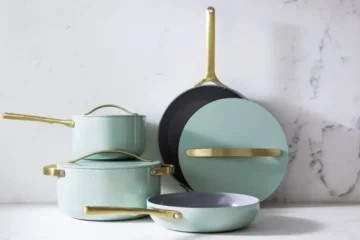Copper cookware has long been a favorite among home cooks and professional chefs alike. It is prized for its excellent heat conductivity and responsiveness, making it ideal for cooking delicate sauces, soups, and other dishes that require precise temperature control. However, with the rise of induction cooktops, many people are left wondering whether copper cookware is compatible with this technology.
Induction cooktops work by creating a magnetic field that induces an electrical current in the metal of the cookware. This current generates heat, which is then transferred to the food. However, not all metals are magnetic, and so not all cookware is compatible with induction cooktops. While copper is an excellent conductor of heat and electricity, it is not magnetic, which means that it will not work on an induction cooktop unless it has a layer of magnetic material on the bottom.
Understanding Induction Cooktops
What is an Induction Cooktop?
An induction cooktop is a type of stove that uses electromagnetic energy to heat up cooking utensils. Unlike traditional stovetops that use gas or electric heating elements to transfer heat to pots and pans, induction cooktops use a magnetic field to generate heat directly in the cookware.
How Do Induction Cooktops Work?
Underneath the glass surface of an induction cooktop, there is a coil of copper wire. When electricity flows through this coil, it creates a magnetic field. When a ferromagnetic metal, such as cast iron or stainless steel, is placed on the cooktop, the magnetic field induces electrical currents within the metal. These currents generate heat, which is transferred directly to the food being cooked.
One of the advantages of induction cooktops is their efficiency. Because the heat is generated directly in the cookware, there is less heat loss to the surrounding air. This means that induction cooktops can heat food faster and use less energy than traditional stovetops.
Another advantage of induction cooktops is their precision. Because the heat is generated directly in the cookware, it is easier to control the temperature of the food being cooked. Induction cooktops also cool down faster than traditional stovetops, which can be an advantage for home cooks who want to avoid overcooking their food.
However, not all cookware is compatible with induction cooktops. In order to work on an induction cooktop, a pot or pan must be made of a ferromagnetic material. Copper, for example, is not ferromagnetic and will not work on an induction cooktop unless it has a magnetic base.
Copper Compatibility with Induction Cooktops
Does Copper Work on Induction Cooktops?
Copper cookware is known for its excellent heat conductivity and even heat distribution. However, when it comes to induction cooktops, copper may not always be the best option. Copper is a non-magnetic material, which means it does not respond to the magnetic field generated by an induction cooktop. As a result, copper cookware cannot be heated through induction cooking unless it has a magnetic base.
Why Copper May Not Work on Induction Cooktops?
Copper cookware is not compatible with induction cooktops because it does not contain iron. Induction cooktops work by creating a magnetic field that interacts with the iron in the cookware, causing the cookware to heat up. Since copper does not contain iron, the magnetic field cannot interact with it, making it unsuitable for induction cooking.
Alternatives to Copper for Induction Cooktops
If you’re looking for cookware that is compatible with induction cooktops, there are several alternatives to copper. Here are some options to consider:
- Cast Iron: Cast iron is an excellent option for induction cooking. It is made of carbon and iron, which makes it ferromagnetic and suitable for induction cooking.
- Stainless Steel: Stainless steel is another great option for induction cooking. It contains iron and is also non-reactive, making it a popular choice for many cooks.
- Aluminum with Induction Base: Some manufacturers now add an iron core or base to aluminum cookware, making it suitable for induction cooking.
- Ceramic: Ceramic cookware is also an option for induction cooking. However, it must have a ferromagnetic base to work with induction cooktops.
Benefits of Using Copper Cookware
Copper cookware is a popular choice among home cooks and professional chefs alike. It is known for its superior heat conductivity, durability, and aesthetic appeal. Here are some of the benefits of using copper cookware on induction cooktops:
Superior Heat Conductivity
Copper is an excellent conductor of heat, second only to silver. This means that copper cookware heats up quickly and distributes heat evenly across the surface of the pan. This makes it ideal for cooking delicate dishes that require precise temperature control, such as sauces and custards.
When used on an induction cooktop, copper cookware heats up even faster due to the electromagnetic field generated by the cooktop. This means that you can save time and energy while cooking, as copper cookware requires less heat to achieve the same results as other types of cookware.
Durability
Copper cookware is also known for its durability. Copper is a soft metal, but when it is combined with other metals such as stainless steel or tin, it becomes much stronger. This makes copper cookware resistant to warping and denting, and it can last for generations with proper care.
When using copper cookware on an induction cooktop, it is important to choose cookware that has a ferromagnetic base, such as copper core cookware. This will ensure that the cookware is compatible with the induction cooktop and will not be damaged by the electromagnetic field.
Aesthetics
In addition to its functional benefits, copper cookware is also prized for its aesthetic appeal. Copper has a warm, rich color that adds a touch of elegance to any kitchen. It also develops a natural patina over time, which many people find attractive.
When purchasing copper cookware for use on an induction cooktop, it is important to choose cookware that has a smooth, flat bottom. This will ensure that the cookware makes good contact with the cooktop and heats up evenly.
How to Choose the Right Cookware for Induction Cooktops?
When it comes to cooking on an induction cooktop, choosing the right cookware is essential. Here are some factors to consider and types of cookware that are compatible with induction cooktops.
Factors to Consider
- Magnetic Properties: Induction cooktops work by creating a magnetic field that induces an electric current in the cookware, causing it to heat up. Therefore, the cookware must be magnetic to work on an induction cooktop. To check if a pot or pan is compatible with an induction cooktop, hold a magnet to the bottom. If the magnet sticks to the underside, the cookware will work on an induction cooktop.
- Flat Bottom: Cookware with a flat bottom is essential for good contact with the induction cooktop. The surface area of the burner should be about the same size as the bottom of the cookware for the best heat conduction.
- Material: The most common materials used for induction cookware are stainless steel, cast iron, and some types of aluminum. Copper cookware is not compatible with induction cooktops unless it has a magnetic layer added to the bottom.
Types of Cookware Compatible with Induction Cooktops
- Stainless Steel: Stainless steel cookware is a popular choice for induction cooktops because it is durable, easy to clean, and has good heat conduction.
- Cast Iron: Cast iron cookware is also compatible with induction cooktops. It is known for its excellent heat retention and even heat distribution.
- Aluminum: Some types of aluminum cookware are compatible with induction cooktops if they have a magnetic layer added to the bottom. However, pure aluminum cookware will not work on an induction cooktop.
Conclusion
In conclusion, copper cookware can work on induction cooktops, but it depends on the specific cookware and the induction cooktop used. Copper is not a ferromagnetic material, which means it cannot be directly heated by induction technology. However, some copper cookware is clad with magnetic materials that can work on induction cooktops.
When choosing copper cookware for an induction cooktop, it is important to look for cookware that has a magnetic layer or is made of ferromagnetic materials. This will ensure that the cookware can be heated by the induction technology.
It is also worth noting that copper is an excellent conductor of heat and electricity, making it a great choice for use with an induction cooktop. However, copper cookware can be more expensive than other types of cookware, so it may not be the best choice for everyone.
Overall, copper cookware can work on induction cooktops, but it is important to choose the right type of cookware to ensure compatibility. When in doubt, it is always recommended to check with the manufacturer or consult the induction cooktop’s manual to determine which types of cookware are compatible.



